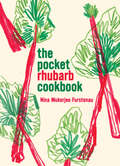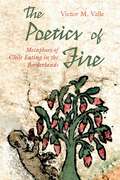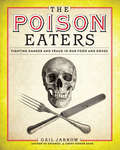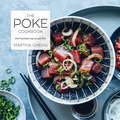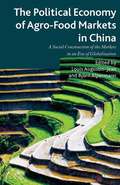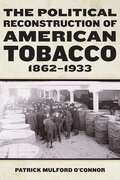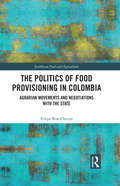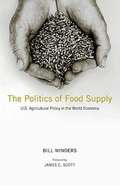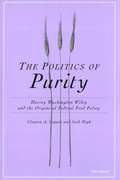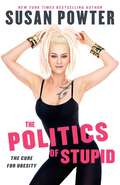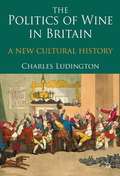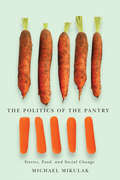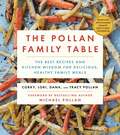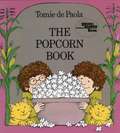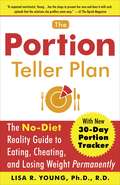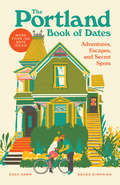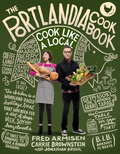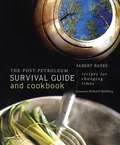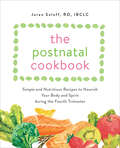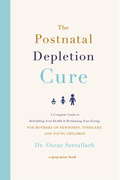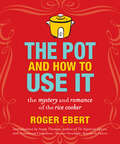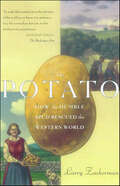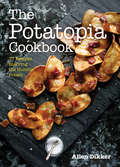- Table View
- List View
The Pocket Rhubarb Cookbook
by Nina Mukerjee FurstenauA handy little cookbook that puts the humble rhubarb in the spotlight. There&’s more to rhubarb than you thought. The distinctive plant was initially used as an herbal medicine, and it eventually became a favorite baking ingredient and was known stateside as the &“pie plant.&” Today, it&’s considered a superfood thanks to its high levels of vitamin C and K and fiber. In over sixty recipes, food journalist and author Nina Mukerjee Furstenau takes readers on a journey through the extensive applications of the tart red stalk. From classics desserts like strawberry-rhubarb pie to savory main dishes, plus preserves, relishes, and even drinks, the best-dressed member of your garden shines in ways you never would have dreamed of.
The Poetics of Fire: Metaphors of Chile Eating in the Borderlands (Querencias Series)
by Victor M. ValleIn The Poetics of Fire, Pulitzer prize–winning journalist and Chicano author Victor M. Valle posits the chile as a metaphor for understanding the shared cultural histories of ChicanX and LatinX peoples from preconquest Mesoamerica to twentieth-century New Mexico. Valle uses the chile as a decolonizing lens through which to analyze preconquest Mesoamerican cosmology, early European exploration, and the forced conversion of Native peoples to Catholicism as well as European and Mesoamerican perspectives on food and place. Assembling a rich collection of source material, Valle highlights the fiery fruit&’s overarching importance as evidenced by the ubiquity of references to the plant over several centuries in literature, art, official documents, and more to offer a new eco-aesthetic reading—a reframing of culinary history from a pluralistic, non-Western perspective.
The Poison Eaters: Fighting Danger And Fraud In Our Food And Drugs
by Gail JarrowFormaldehyde, borax, salicylic acid. Today, these chemicals are used in embalming fluids, cleaning supplies, and acne medications. But in 1900, they were routinely added to food that Americans ate from cans and jars.In 1900, products often weren't safe because unregulated, unethical companies added these and other chemicals to trick consumers into buying spoiled food or harmful medicines. Chemist Harvey Washington Wiley recognized these dangers and began a relentless thirty-year campaign to ensure that consumers could purchase safe food and drugs, eventually leading to the creation of the U.S. Food and Drug Administration, or FDA, a US governmental organization that now has a key role in addressing the COVID-19/Coronavirus pandemic gripping the world today. Acclaimed nonfiction and Sibert Honor winning author Gail Jarrow uncovers this intriguing history in her trademark style that makes the past enthrallingly relevant for today's young readers.Six starred reviews -- ★Booklist ★BCCB ★Kirkus Reviews ★Publishers Weekly ★School Library Connection ★Shelf AwarenessAn ALSC Notable Children's Book * A Washington Post Best Children's Book * NCTE Orbis Pictus Honor Book * A BCCB Blue Ribbon * A Kirkus Reviews Best Children's Book * A NSTA Outstanding Science Trade Book for Students K-12 * A Chicago Public Library Best Children's Book★ "Revolting and riveting in turns, Jarrow's masterfully crafted narrative will fundamentally alter how readers view their food.Though laced with toxins, this is anything but toxic." -- Kirkus Reviews, starred review
The Poke Cookbook: The Freshest Way to Eat Fish
by Martha ChengPoke, the traditional Hawaiian snack of raw fish seasoned with soy sauce and sesame oil, has hit the mainland. On the islands, it’s the casual dish that brings everyone together—but now you can bring these flavors into your own kitchen with 45 recipes for traditional poke, modern riffs, bases, bowls, and other local-style accompaniments. From classic Shoyu Ahi to creative Uni, Lychee, and Coconut to vegetarian Mango and Jicama, poke is delicious, simple, and endlessly customizable.
The Political Economy of Agro-Food Markets in China
by Louis Augustin-Jean Björn AlpermannChina's agricultural production and food consumption have increased tremendously, leading to a complete evolution of agro-food markets. The book is divided into two parts; the first part reviews the theoretical framework for the 'social construction of the markets,' while the second part presents the implication for the agro-food markets in China.
The Political Reconstruction of American Tobacco, 1862-1933 (Reconstructing America)
by Patrick Mulford O’ConnorA deeply researched and clearly argued account of the mutual growth of the federal government and the modern tobacco Nearly everything about the United States tobacco economy changed in the generation following the American Civil War. From labor to consumption, manufacturing to regulation, tobacco was utterly reconstructed, “comparatively a new industry,” as one contemporary wrote.The Political Reconstruction of American Tobacco, 1862–1933 exposes the causes of these changes, and in the process, it reconsiders cornerstones of the American national narrative. Through a detailed rendering of tobacco’s late-nineteenth-century political economy, this book argues that the federal state’s and American capitalism’s development were mutually constitutive—and fundamentally political—processes. From the Civil War to the Progressive Era, diverse political movements across tobacco’s commodity chain drove state and market development, creating the immense power and stifling poverty that defined tobacco’s reconstruction. The Political Reconstruction of American Tobacco, 1862–1933 emphasizes the significance of the thousands of manufacturers whose interest groups shaped federal tax policy and, in turn, forged a powerful and effective internal revenue system; the increasingly influential fertilizer producers and warehouse operators who determined tobacco’s value; and the crop scientists who sought to promote and rationalize US tobacco production. As these actors reshaped tobacco’s commodity chain, they missed, and even dismissed, the interests of tobacco growers, especially newly emancipated African Americans and smallholding whites throughout the South.The ruling logic of tobacco’s reconstructed political economy rationalized agrarian indebtedness, justified low prices, and intensified labor discipline on thousands of small farms. In emphasizing these exclusions, The Political Reconstruction of American Tobacco, 1862–1933 reveals how nineteenth-century state and economic development coincided with and even created rural poverty.
The Politics Of Food
by Joel SolkoffExamines the agriculture policies of the United States government and argues that present programs could lead to food shortages.
The Politics of Food Provisioning in Colombia: Agrarian Movements and Negotiations with the State (Earthscan Food and Agriculture)
by Felipe Roa-ClavijoThis book explores food provisioning in Colombia by examining the role and impact of the agrarian negotiations which took place in the aftermath of the 2013–2014 national strikes. Most of the research in the field of agrarian studies in Colombia has focused on inequalities in land distribution, the impacts of violent conflict, and most recently, the first phase of the peace agreement implementation. This book links and complements these literatures by critically engaging with an original framework that uncovers the conflicts and politics of food provisioning: who produces what and where, and with what socio-economic effects. This analytical lens is used to explain the re-emergence of national agrarian movements, their contestation of the dominant development narratives and their engagement in discussions about food sovereignty with the state. The analysis incorporates a wide range of voices from high-level government representatives and leaders from national agrarian movements. Their narratives of food provisioning and the broader role of the food industry are reviewed and the key findings show an underlying conflict within food provisioning based on the struggle of marginalised smallholders to develop alternative agri-food systems that can be included in the local and domestic food markets in the context of a state dominated by an export and import approach. Overall, the book argues that the battle ground of agrarian conflicts has moved to the fi eld of food provisioning and using this approach has the potential to reframe the debate about the future of food and agriculture in Colombia and beyond. This book will be of great interest to students and scholars of food and agriculture, rural development, peasant studies, and Latin American Studies.
The Politics of Food Supply: U.S. Agricultural Policy in the World Economy
by Bill WindersThis book deals with an important and timely issue: the political and economic forces that have shaped agricultural policies in the United States during the past eighty years.
The Politics of Purity: Harvey Washington Wiley and the Origins of Federal Food Policy
by Jack High Clayton A. CoppinSpearheaded by Harvey Washington Wiley, the Pure Food and Drugs Act of 1906 launched the federal regulation of food and drugs in the United States. Wiley is often lauded as a champion of public interest for bringing about a law that required healthful ingredients and honest labeling. Clayton Coppin and Jack High demonstrate, however, that Wiley was in fact surreptitiously allied with business firms that would benefit from regulation and moreover, that the law would help him build his government agency, the Federal Bureau of Chemistry. Coppin and High discuss such issues as Wiley's efforts to assign the law's enforcement to his own bureau. They go on to expose the selectivity of Wiley's enforcement of the law, in which he manipulated commercial competition in order to reward firms that supported him and penalize those that opposed him. By examining the history of the law's movement, the authors show that, rather than acting in the public interest, Wiley used the Pure Food and Drugs Act to further his own power and success. Finally, they analyze government regulation itself as the outcome of two distinct competitive processes, one that takes place in the market, the other in the polity. The book will interest scholars concerned with government regulation, including those in economics, political science, history, and business. Clayton Coppin is a management consultant and historian, Koch Industries, Wichita. Jack High is Professor of Economics, George Mason University.
The Politics of Stupid: The Cure for Obesity
by Susan PowterNew York Times bestselling author Susan Powter returns with a real-life, commonsense guide to weight loss, complete with her trademark outrageous, uproarious humor. Susan Powter is back with her finest work yet! The Politics of Stupid is a revolutionary weight-loss program that shows people how they can reclaim their bodies and their brains. From food manufacturers to huge government lobbies to the fitness and diet industries, Powter illuminates why obesity is epidemic, and why millions of people are suffering the unnecessary consequences of being overfat and unfit. Inside this book you will learn: Who is the most powerful consumer in America's $276 billion food industry. Susan Powter's Lifestyle X-change program -- a revolutionary, interactive Web-supported program that tells the simple truth about weight loss and is refreshingly Susan Powter. How to motivate yourself to perform thirty minutes of regular cardio and strength training six days a week and achieve maximum results!
The Politics of Wine in Britain
by Charles LudingtonA unique look at the meaning of the taste for wine in Britain, from the establishment of a Commonwealth in 1649 to the Commercial Treaty between Britain and France in 1860 - this book provides an extraordinary window into the politics and culture of England and Scotland just as they were becoming the powerful British state.
The Politics of the Pantry
by Michael Mikulak"What's for dinner?" has always been a complicated question. The locavore movement has politicized food and challenged us to rethink the answer in new and radical ways. These days, questions about where our food comes from have moved beyond 100-mile-dieters into the mainstream. Celebrity chefs Jamie Oliver and Alice Waters, alternative food gurus such as Michael Pollan, and numerous other popular and academic commentators have all talked about the importance of understanding the sources and transformation of food on a human scale. In The Politics of the Pantry, Michael Mikulak interrogates these narratives - what he calls "storied food" - in food culture. As with any story, however, it is important to ask: who is telling it? Who is the audience? What assumptions are being made? Mikulak examines competing narratives of food, pleasure, sustainability, and value that have emerged from the growing sustainable food movement as well as food's past and present relationship to environmentalism in order to understand the potential and the limits of food politics. He also considers whether or not sustainable food practices can address questions about health, environmental sustainability, and local economic development, while at the same time articulating an ethical globalization. An innovative blend of academic analysis, poetic celebration, and autobiography, The Politics of the Pantry provides anyone interested in the future of food and the emergence of a green economy with a better understanding of how what we eat is transforming the world.
The Politics of the Pantry: Stories, Food, and Social Change
by Michael Mikulak"What's for dinner?" has always been a complicated question. The locavore movement has politicized food and challenged us to rethink the answer in new and radical ways. These days, questions about where our food comes from have moved beyond 100-mile-dieters into the mainstream. Celebrity chefs Jamie Oliver and Alice Waters, alternative food gurus such as Michael Pollan, and numerous other popular and academic commentators have all talked about the importance of understanding the sources and transformation of food on a human scale. In The Politics of the Pantry, Michael Mikulak interrogates these narratives - what he calls "storied food" - in food culture. As with any story, however, it is important to ask: who is telling it? Who is the audience? What assumptions are being made? Mikulak examines competing narratives of food, pleasure, sustainability, and value that have emerged from the growing sustainable food movement as well as food's past and present relationship to environmentalism in order to understand the potential and the limits of food politics. He also considers whether or not sustainable food practices can address questions about health, environmental sustainability, and local economic development, while at the same time articulating an ethical globalization. An innovative blend of academic analysis, poetic celebration, and autobiography, The Politics of the Pantry provides anyone interested in the future of food and the emergence of a green economy with a better understanding of how what we eat is transforming the world.
The Pollan Family Table: The Very Best Recipes and Kitchen Wisdom for Delicious Family Meals
by Michael Pollan Corky Pollan Dana Pollan Lori Pollan Tracy PollanA gorgeous, fully illustrated collection of recipes, cooking techniques, and pantry wisdom for delicious, healthy, and harmonious family meals from the incredible Pollan family--with a foreword from Michael Pollan.In The Pollan Family Table, Corky, Lori, Dana, and Tracy Pollan invite you into their warm, inspiring kitchens, sharing more than 100 of their family's best recipes. For generations, the Pollans have used fresh, local ingredients to cook healthy, irresistible meals. Michael Pollan, whose bestselling books have changed our culture and the way we think about food, writes in his foreword about how the family meals he ate growing up shaped his worldview. This stunning and practical cookbook gives readers the tools they need to implement the Pollan food philosophy in their everyday lives and to make great, nourishing, delectable meals that bring families back to the table. Standouts like Grand Marnier Citrus Roasted Chicken, Crispy Parmesan Zucchini Chips, and Key Lime Pie with Walnut Oatmeal Crust are easy to make yet sophisticated enough to dazzle family and friends. With hundreds of exquisite color photographs, The Pollan Family Table includes the Pollan's top cooking tips and techniques, time-tested shortcuts, advice for those just starting out and market and pantry lists that make shopping for and preparing dinner stress-free. This instant kitchen classic will help readers create incredible meals and cultivate traditions that improve health, well-being, and family happiness.
The Popcorn Book
by Tomie DepaolaPresents a variety of facts about popcorn and includes two recipes. Copyright © Libri GmbH. All rights reserved.
The Portion Teller Plan: The No Diet Reality Guide to Eating, Cheating, and Losing Weight Permanently
by Lisa R. YoungThe Portion Teller Plan is a sensible eating guide and the end of diet deprivation. No forbidden foods, no calorie counting. Welcome to diet liberation.Would you ever consider going to the kitchen in the morning and grabbing five slices of bread for breakfast? No? Just one bagel is more like it, right? Well, your morning bagel is equivalent to eating five slices of bread. Your steak at dinner is equal to the protein in eighteen eggs. And that huge bowl of pasta you had at lunch is anybody's guess. Nobody likes to cut back but the cold hard facts are in: Portion sizes have steadily increased over the past thirty years and our collective waistlines are ballooning right along with them. You may need to eat a little less if you want to lose weight, but with The Portion Teller Plan you can eat all of your favorite foods. Nutrition and portion size expert Dr. Lisa Young presents an individualized guide to eating according to your portion personality and food preferences. You'll learn a simple system of visuals-a deck of cards, a baseball, your own hand-to help gauge portion size. You'll be able to eat out, eat in, cheat, and eat on the road without ever being a portion victim again.
The Portland Book of Dates: Adventures, Escapes, and Secret Spots
by Eden Dawn Ashod SimonianThis highly visual book marries style and substance to give Portland and the people who love her the guidebook they deserve: a curated and creative collection of more than 130 outings in and around Portland to inspire romance and adventure. Secret spots, beloved locales, and unexpected destinations offer endless options for date night or a weekend getaway.Finally, a stylish, cheeky, curated guidebook of cool places for Portlanders (and visitors) to go on dates/outings/field trips/adventures. These range from one-hour coffee and ice cream dates in Portland's neighborhoods to multiday expeditions to Hood River and Mount St. Helens. The authors have a bead on the obscure and fascinating, and the descriptions are motivating enough to prompt even the lazy to head out the door. The book will have serious pickup power and will become an essential resource and armchair read for Portland-area Gen X, millennial, and Gen Z couples (and singles with friends) interested in learning about off-the-beaten-path things to do, see, and taste. No more FOMO! In-the-know authors and tastemakers Eden Dawn and Ashod Simonian will reveal where the cool and quirky go, while educating readers on this beloved city.
The Portlandia Cookbook: Cook Like a Local
by Fred Armisen Carrie Brownstein Jonathan KriselThe companion cookbook to the hit show Portlandia by the Emmy-nominated stars and writers Fred Armisen and Carrie Brownstein, with 50 delicious recipes for every food lover, freegan, organic farmer, and food truck diehard. Food plays a very special role in Fred Armisen and Carrie Brownstein's award-winning satire Portlandia. Here are recipes for the dishes that define the show, from cult-raised chicken and Stu's stews to pickled veggies and foraged green salads. Complete with new full-color finished food photographs and illustrations, humorous stories and sidebars from the loveable food-obsessed Portlandia characters (such as Mr. Mayor, Peter and Nance, and Colin the chicken), and advice on how to choose a bed and breakfast and behave at a communal table, this is a funny cookbook--with serious recipes--for anyone who loves food. And yes, the chicken's local.
The Post-Petroleum Survival Guide and Cookbook
by Albert BatesA world beyond petroleum needn't be a scary proposition - it can be something to relish. As we move from a global culture addicted to cheap, abundant petroleum to a culture of compelled conservation, The Post-Petroleum Survival Guide and Cookbook provides useful, practical advice for preparing your family and community to make the transition.
The Postnatal Cookbook: Simple and Nutritious Recipes to Nourish Your Body and Spirit During the Fourth Trimester
by Jaren SoloffReplenish and rejuvenate your postpartum body with these seventy-five easy, healing, and protein-rich recipes designed with new moms in mind.If you’re a new or expecting mother, you probably know how important nutrition is during pregnancy. But you should pay just as much attention to nutrition in the fourth trimester, a vitally important time for recovering from your major physical and emotional journey.The delicious recipes in The Postnatal Cookbook are specifically formulated for a new mom’s nutritional needs. You’ll learn how to replenish and rejuvenate your postpartum body with uncomplicated, healing, and satisfying recipes like:Sweet Potato Breakfast BowlsRoasted Tomato and Fennel SoupHerb Baked SalmonQuick Chicken CurryGarlic HummusChia PuddingCrafted by a registered dietitian and lactation consultant, these recipes are paired with nutritional information and thoughtful tips for easy prep to help you nourish your body and thrive in the postpartum period!
The Postnatal Depletion Cure: A Complete Guide To Rebuilding Your Health And Reclaiming Your Energy For Mothers Of Newborns, Toddlers And Young Children
by Dr Oscar SerrallachIt's all too common to hear new mums talk about 'baby brain' and extreme fatigue. But what if it wasn't the physical toll of giving birth, breastfeeding or chasing a toddler that was sapping your strength? What it if was something deeper? Dr. Oscar Serallach has spent his medical career witnessing women fail hormonally, nutritionally and emotionally to get back on their feet after having a baby. The true cause? A syndrome he calls postnatal depletion. THE POSTNATAL DEPLETION CURE is the first book to name the syndrome and to offer a practical programme to help mothers replenish their bodies after having a baby. The book includes a comprehensive guide to the nutrients women need to enhance organ function and balance hormones, along with advice on how to maintain a healthy diet and exercise routine and get necessary rest, despite the demands of motherhood. Filled with prescriptive takeaways and many success stories, THE POSTNATAL DEPLETION CURE will help mothers be the best they can be physically and emotionally.
The Pot and How to Use It: The Mystery and Romance of the Rice Cooker
by Roger EbertA guide to the handy kitchen appliance, plus a range of recipes, from the Pulitzer Prize–winning movie critic.In The Pot and How to Use It, Roger Ebert—Pulitzer Prize–winning film critic, admitted “competent cook,” and long-time electric rice cooker enthusiast—gives readers a charming, practical guide to this handy and often-overlooked kitchen appliance.While The Pot and How to Use It contains numerous and surprisingly varied recipes for electric rice cookers, it is much more than a cookbook. Originating from a blog entry on Roger’s popular Web site, the book also includes readers’ comments and recipes alongside Roger’s own discerning insights and observations on why and how we cook.With an introduction by vegetarian cookbook author Anna Thomas and expert assistance from recipe consultant and nutritionist Yvonne Nienstadt, The Pot and How to Use It is perfect for fans of Roger’s superb writing, as well as anyone looking to incorporate the convenience and versatility of electric rice cookers into his or her kitchen repertoire.
The Potato: How the Humble Spud Rescued the Western World
by Larry ZuckermanThe Potato tells the story of how a humble vegetable, once regarded as trash food, had as revolutionary an impact on Western history as the railroad or the automobile. Using Ireland, England, France, and the United States as examples, Larry Zuckerman shows how daily life from the 1770s until World War I would have been unrecognizable-perhaps impossible-without the potato, which functioned as fast food, famine insurance, fuel and labor saver, budget stretcher, and bank loan, as well as delicacy. Drawing on personal diaries, contemporaneous newspaper accounts, and other primary sources, this is popular social history at its liveliest and most illuminating.
The Potatopia Cookbook: 77 Recipes Starring the Humble Potato
by Allen Dikker&“Fantastic, unique recipes . . . Whether you want to accent your favorite meal with a potato dish or make an exciting main dish.&” —Broadway World Latkes. Gnocchi. Aligot. Knishes. Samosas. Munini-imo. Poutine. Potatoes—consumed globally at a rate of about sixty-eight pounds per capita each year—are the stars of some of the world&’s most beloved dishes. Perhaps this is why most of us tend to underestimate the humble tuber—it&’s so familiar that we forget its full potato potential. Enter The Potatopia Cookbook, a collection of more than seventy-five creative potato recipes from Allen Dikker, the CEO and founder of Potatopia, the fast-casual all-potato restaurant that has been featured by the New York Times, the Village Voice, and Eater.com, among others. While the cookbook includes some traditional potato dishes like gnocchi and shepherd&’s pie, most recipes are innovative creations that reimagine the world&’s most popular vegetable. Ever thought to make lasagna with paper-thin potato slices instead of noodles? Or prepare truffles with mashed potatoes? Find it all in The Potatopia Cookbook alongside detailed descriptions of potato varieties, potato history, and potato preparation and storage tips. As an added bonus to their popularity, potatoes are naturally gluten-free and—when prepared simply—very nutritious. Along with being fat-, sodium-, and cholesterol-free, potatoes are packed with vitamins, minerals, and antioxidants. As he did with Potatopia&’s menu, Dikker highlights these benefits in the cookbook by focusing on recipes that skip the fat in favor of keeping it healthy. The result is a hearty, wholesome celebration of all things potato. &“A culinary journey guided by the simple, often underappreciated tuber.&” —Foreword Reviews
